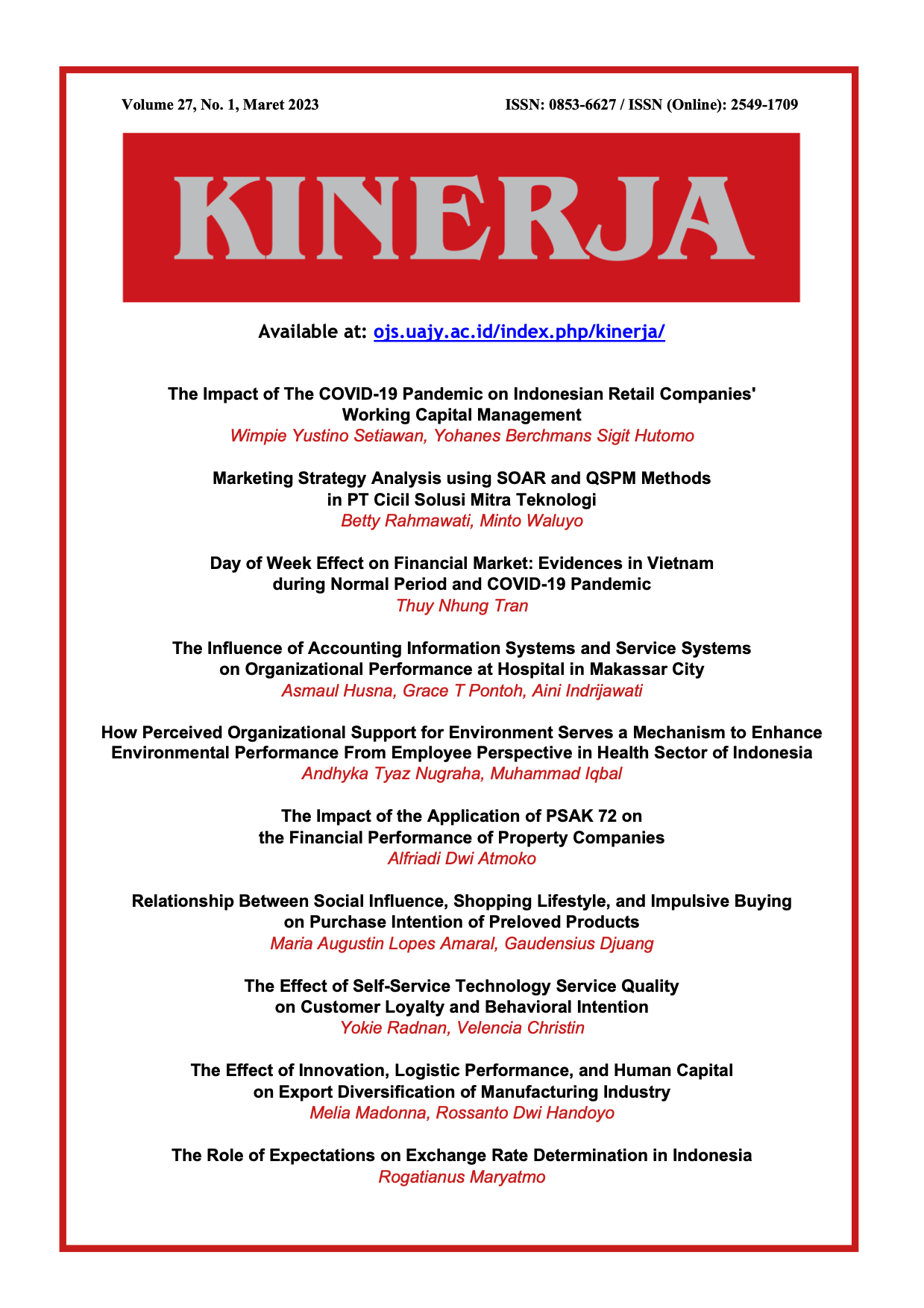Day of Week Effect on Financial Market: Evidence in Vietnam during Normal Period and COVID-19 Pandemic
DOI:
https://doi.org/10.24002/kinerja.v27i1.6377Keywords:
day-of-the-week effect, COVID-19, seasonal information, stock returnAbstract
The article is focused on examining the existence of the day-of-the-week (DOW) effect on the Vietnamese stock market. This study uses the daily series of closed market indexes data from 2014 to 2021 and extends to a deep-dive review of the outbreak period of the COVID-19 pandemic. Furthermore, the regression model with dummy variables and parametric and non-parametric methods are employed to identify the existence of the DOW effect on stock market returns and volatility. The empirical results obtained from the above models have demonstrated that the day-of-the-week effect impacts stock returns shown in three out of four indices, especially on Mondays and Fridays. At the same time, no statistical evidence supports the presence of any significant daily patterns for either the COVID-19 outbreak phase or in the HNX30. Particularly, the highest return occurs on Monday, and the lowest volatility usually appears on Friday in all three HOSE Indexes. This study contributed further evidence for not only the presence of the day-of-the-effect patterns on the Vietnamese stock market but also path the ways to analyze the stock returns and variance of financial assets during the COVID-19 epidemic.
References
Abdullah, S., Siddiqua, S., Siddiquee, M. & Hossain, N., 2017. Modeling and forecasting exchange rate volatility in Bangladesh using GARCH models: a comparison based on normal and Student’s t-error distribution. Financial Innovation, 3(18).
Agrawal, A. & Tandon, K., 2001. Anomalies or illusions? Evidence from stock markets in eighteen countries. Journal of International Money and Finance, 13(1), p. 83-106.
Aggarwal, R., & Rivoli, P., 1989. Seasonal and Day-of-the-Week Effects in Four Emerging Stock Markets. The Financial Review, 24(4), p. 541–550.
Alexakis, P., & Xanthakis, M., 1995. Day of the week effect on the Greek stock market. Applied Financial Economics, 5(1), p. 43–50. doi:10.1080/758527670
Anwar, Y., & Mulyadi, M.S., 2009. The day of the week effects in Indonesia, Singapore, and Malaysia stock market. MPRA Paper, No. 16873.
Apolinario, R., Santana, O., Sales, L. & Caro, A., 2006. Day of the week effect on European stock markets. International Research Journal of Finance and Economics, 2, p. 53-70.
Bala, D.A. & Asemota, J.O., 2013. Exchange–rates volatility in Nigeria: Application of GARCH Models with exogenous break. CBN Journal of Applied Statistics, 4(1), p. 89-116.
Basdas, U., 2011. The day-of-the-week effect for Istanbul stock exchange: a stochastic dominance approach. Journal of Applied Finance & Banking, 1(4), p. 223-238.
Basher, S. A., and Sadorsky, P., 2006. Day-of-the-week effects in emerging stock markets. Applied Economics Letters, 13(10), p. 621–628.
Bing, X., 2016. The Monthly Effect and the Day of the Week Effect in the American Stock Market. International Journal of Financial Research, 7(2), p. 11-17.
Caporale, G. M., & Plastun, A., 2019. The day of the week effect in the cryptocurrency market. Finance Research Letters, 31, p. 258-269. doi:10.1016/j.frl.2018.11.012
Chang, E. C., Pinegar, J. M., & Ravichandran, R., 1993. International Evidence on the Robustness of the Day-of-the-Week Effect. The Journal of Financial and Quantitative Analysis, 28(4), p. 497. doi:10.2307/2331162
Chien, C. C, Lee, C. & Wang, A. M. L., 2002. A note on stock market seasonality: The impact of stock price volatility on the application of dummy variable regression model. The Quarterly Review of Economics and Finance, 42(1), p. 155-162.
Choudhry, T., 2000. Day of the week effect in emerging Asian stock markets: evidence from the GARCH model. Applied Financial Economics, 10(3), p. 235–242.
Dao, L.T.A., Gan, C., 2020. The impact of the COVID-19 lockdown on stock market performance: evidence from Vietnam. Journal of Economic Studies, 48(4), p. 836-851.
Dao, V.H., Nguyen, T.M.H., & Vu, T.D., 2021. The Impact of COVID-19 on stock market returns in Vietnam. Journal of Risk and Financial Management, 14:441.
Djalil, M.A., Yahya, M.R., & Aini, Q., 2018. Analysis the influence of day of the week, monday, and weekend effect of on seasonal anomaly in stock return: evidence of companies on LQ45 Indonesia in Indonesia Stock Exchange. Proceeding of 4th Sriwijaya Economics, Accounting, and Business Conference. Universitas Sriwijaya, Indonesia.
Fama, E., 1965. The behavior of stock market prices. The Journal of Business, 38(1), p. 34-105.
Fasanya, I.O. and Adekoya, O.B., 2017. Modelling inflation rate volatility in Nigeria with structural breaks. CBN Journal of Applied Statistics, 8(1), p. 175-193.
Findley, D., Monsell, B., 2009. Modeling Stock Trading Day Effects Under Flow Day-of-Week Effect Constraints,” Journal of Official Statistics, 25(3), p. 415–430.
French, K., 1980. Stock returns and the weekend effect. Journal of Financial Economics, 8(1), p. 55-69.
Garg, A., Bodla, B. & Chhabra, S., 2010. Seasonal anomalies in stock returns: a study of developed and emerging markets. IIMS Journal of Management Science, 1(2), p. 165-179.
Gibbons, M. & Hess, P., 1981. Day of the week effects and asset returns. The Journal of Business, 54(4), p. 579-596.
Greenland, S., Senn, S., Rothman, K., Carlin, J., Poole, C., Goodman, S. & Altman, D., 2016. Statistical tests, P values, confidence intervals, and power: a guide to misinterpretations. European Journal of Epidemiology, 31, p. 337–350. doi: 10.1007/s10654-016-0149-3.
Gujarati, D.N., 2011. Econometrics by example. London, UK: Palgrave Macmillan
Hla, D. & Teru, S. P., 2015. Efficiency of accounting information system and performance measures – Literature Review. International Journal of Multidisciplinary and Current Research, 3, p. 976-984.
Hojat, M., Xu, G., 2004. A Visitor’s Guide to Effect Sizes. Advances in Health Sciences Education. 9(3): p. 241–249.
Jacobs, B. & Levy, K. N., 1988. Calendar anomalies: Abnormal returns at calendar turning points. Financial Analysts Journal, 44(6), p. 28-39.
Kaeppel, J., 2009. Seasonal stock market trends: The definitive guide to calendar-based stock market trading. US: John Wiley & Sons, Inc.
Ke, M.-C., Chiang, Y.-C., & Liao, T. L., 2007. Day – of – the - week effect in the Taiwan foreign exchange market. Journal of Banking & Finance, 31(9), p. 2847–2865.
Kelly, B. & Pruitt, S., 2013. Market expectations in the cross-section of present values. The Journal of Finance, 68(5), p. 1721-1756. doi: 10.1111/jofi.12060.
Kuhe, A., 2018. Modeling volatility persistence and asymmetry with exogenous breaks in the Nigerian stock returns. CBN Journal of Applied Statistics, 9(1), p. 167-196.
Kuria, A. & Riro, G., 2013. Stock market anomalies: A study of seasonal effects on average returns of Nairobi Securities Exchange. Research Journal of Finance and Accounting, 4(7), p. 207-216.
Mackinnon, J. G., 1996. Numerical distribution functions for unit root and cointegration tests. Journal of Applied Econometrics, 11(6), p. 601-618.
Mehdian, S. & Perry, M. J., 2001. The reversal of the Monday effect: New evidence from US equity markets. Journal of Business Finance & Accounting, 28(7-8), p. 1043-1065.
Nguyen, C.T., Phan, T.H., Nguyen, H.K., 2021. Stock market returns and liquidity during the COVID-19 outbreak: evidence from the financial services sector in Vietnam. Asian Journal of Economics and Banking, 5(3), p. 324-342
Olowe, R., 2009. Stock return volatility, global financial crisis and the monthly seasonal effect on the Nigerian stock exchange. African Review of Money Finance and Banking, p. 73-107.
PeÑa, J. I., 1995. Daily seasonalities and stock market reforms in Spain. Applied Financial Economics, 5(6), p. 419–423. doi:10.1080/758538601.
Phillips, P. & Perron, P., 1988. Testing for a unit root in time series regression. Biometrika, 75(2), p. 335-346. doi: 10.1093/biomet/75.2.335.
Poshakwale, S., 1996. Evidence on weak form efficiency and day of the week effect in the Indian Stock Market. Finance India, X (3), p. 605-616.
Rogalski, R. J., 1984. New findings regarding day-of-the-week returns over trading and non-trading periods: A note. The Journal of Finance, 39(5), p. 1603–1614.
Rodríguez, A., 2006. Day of the Week Effect on European Stock Markets. International Research Journal of Finance and Economics, 2, p. 53-70.
Rystrom, D. S., & Benson, E. D., 1989. Investor psychology and the day-of-the-week effect. Financial Analysts Journal, 45(5), p. 75–78. doi:10.2469/faj.v45.n5.75
Sharma, S., 2011. Day of week effect: Evidences from Indian Stock Market. Indian Journal of Commerce and Management Studies, 2(6), p. 25-30.
Solnik, B., & Bousquet, L., 1990. Day-of-the-week effect on the Paris Bourse. Journal of Banking & Finance, 14(2-3), p.461–468. doi:10.1016/0378-4266(90)90059-b.
Theodossiou, P., & Lee, U., 1995. Relationship between volatility and expected returns across international stock markets. Journal of Business Finance & Accounting, 22(2), p.289–300.
Truong, Q-T., Nguyen, D.N., Tran, N-Q., Al-Mohamad, S., & Barky, W., 2020. COVID-19 in Vietnam: What happened in the stock market? Available at SSRN: https://ssrn.com/abstract=3654017 or http://dx.doi.org/10.2139/ssrn.3654017
Ulussever, T., Yumusak, I. G. & Kar, M., 2011. The Day-of-the-week effect in the Saudi stock exchange: a non-linear Garch analysis. Journal of Economic and Social Studies, 1(1), p.9-23.
Wong, K., Hui, T. & Chan, C., 2006. Day-of-the-week effects: evidence from developing stock markets. Applied Financial Economics, 2(1), p.49-56. doi: 10.1080/758527546.
Yalcin, Y., & Yucel, E., 2006. The day-of-the-week effect on stock-market volatility and return: evidence from emerging markets,” Czech Journal of Economics and Finance, 56, p. 258-279.
Yamori, N., & Kurihara, Y., 2004. The day-of-the-week effect in foreign exchange markets: multi-currency evidence. Research in International Business and Finance, 18(1), p. 51–57.















